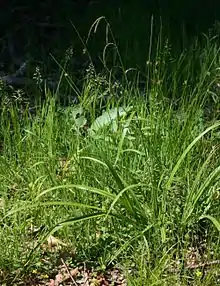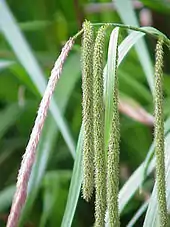Carex pendula
Carex pendula (pendulous sedge,[1] also known as hanging, drooping or weeping sedge) is a large sedge of the genus Carex. It occurs in woodland, scrubland, hedges and beside streams, preferring damp, heavy clay soils. It is sometimes grown as a garden plant because of its distinctive appearance.
| Carex pendula | |
|---|---|
 | |
| Scientific classification | |
| Kingdom: | |
| (unranked): | |
| (unranked): | Monocots |
| (unranked): | |
| Order: | |
| Family: | |
| Genus: | |
| Species: | C. pendula |
| Binomial name | |
| Carex pendula | |
It is native to western, central and southern parts of Europe occurring north to Sweden, Denmark and parts of Scotland where it reaches 58° N. It is also found in north-west Africa, the Azores, Madeira and parts of the Middle East.[2]
Description

Carex pendula is a tall, perennial plant which forms large, dense tufts. It can grow to 1.8 metres, occasionally reaching 2.4 metres. The smooth stems are triangular in cross-section with rounded angles. The long, hairless leaves are yellowish-green above and glaucous below. They are 8–20 mm wide. The simple flowers are borne on long, drooping, catkin-like spikes. There are 1–2 male spikes at the top of the stem with usually 4–5 female spikes below them. The male spikes are 55–160 mm long while the females spikes are 50–260 mm long and 5–7 mm wide. The fruits are green-brown and 3–5 mm long with a 1–2.5-mm beak. The plant typically flowers from May to June and fruits from June to July.
It has been introduced to New Zealand and has begun to spread into the wild in the United States, where it has been recorded from Washington and Virginia.[3]
References
- "BSBI List 2007". Botanical Society of Britain and Ireland. Archived from the original (xls) on 2015-01-25. Retrieved 2014-10-17.
- "Carex pendula". Germplasm Resources Information Network (GRIN). Agricultural Research Service (ARS), United States Department of Agriculture (USDA). Retrieved 23 July 2008.
- Flora of North America. Carex pendula. Accessed 23 July 2008.
- Stace, Clive A. (1997) New Flora of the British Isles, Cambridge University Press.
- Tutin, T. G. et al. (1980) Flora Europaea, Volume 5. Cambridge University Press.
External links
 Media related to Carex pendula at Wikimedia Commons
Media related to Carex pendula at Wikimedia Commons Data related to Carex pendula at Wikispecies
Data related to Carex pendula at Wikispecies